News
Shadow of Elysium Released!
My Shadow Campaigns novella, The Shadow of Elysium, is out today! Take a look.
My Shadow Campaigns novella, The Shadow of Elysium, is out today! Take a look.
If you know me at all, you probably know that I like cats. My cats, Sakaki and The Tomoes, were eager to help me advertise THE FORBIDDEN LIBRARY, as depicted below.
Now it’s your cats’ turn!
From now until the release of THE MAD APPRENTICE, on April 21st, everyone who emails an appropriate picture to catcontest@djangowexler.com will be entered in the giveaway! Winners will receive a hardcover copy of THE MAD APPRENTICE, signed by me and personalized as you like.
Pictures should contain, at minimum, the following:
-A copy of THE FORBIDDEN LIBRARY. (Kindle, audio, etc are fine!)
-A cat.
UPDATE!
My UK publisher has agreed to ship copies to UK winners, so the contest is officially open to UK entrants! Winners in the UK will receive UK (paperback) editions, and I will try to send over a signed bookplate to put in them.
Questions?
What if I don’t have a copy of THE FORBIDDEN LIBRARY?
They are available wherever books are sold, in paperback, e-book, or audiobook! THE MAD APPRENTICE is a sequel, so you’d want to read the first book first anyway.
What if I don’t have a cat?
That is a serious problem and you should remedy it immediately!
For those who are, for whatever sad reason, unable to get a cat, some creativity will be required. Here are some possible options:
Caveats
Now go forth and photograph cats with books!
So, if you are one of the lucky people who doesn’t follow the twitter-sphere, here’s the story so far. The Hugo Awards, SFFs most influential honors, announced their list of nominees on Saturday. A group of writers on the conservative side of the political spectrum had campaigned for a slate of nominees, the Sad Puppies, and were very successful in getting their picks onto the ballot, completely taking over some of the categories. Many people were very upset by this, which was probably the point. I’ve been participating in multiple simultaneous discussions, so I thought I’d write up some thoughts here where I can conveniently link them.
Various people have accused the SPs of cheating, which is almost certainly not the case. On the SP side, people have been crowing that this shows they’re really in the majority, which is also almost certainly not the case. Given the way the Hugo nomination process is structured, organized slate voting is a dominant strategy, and a minority being able to completely dominate the ballot should be an expected result.
If you’re not familiar with it, the process is pretty simple. In each of the various categories (Best Novel, Best Novella, and so on) each voter can nominate up to five works. The votes are all added up, and the top five in each category become the nominees, to be voted on at WorldCon to determine the winner. The SP strategy was to pick five works for each category and encourage their voters to choose those five.
Let’s consider a hypothetical election between Green and Purple voters. There are 800 Greens in the voting pool, and 200 Purples. The Greens mostly prefer Green works, of which there are, say, 10 in serious contention — we’ll call those G1, G2, etc. The Purples similarly prefer Purple works, P1, P2, etc.
The Greens have no organization. Each Green picks the five works out of the ten that he or she personally likes best. Assuming each work has its fans, this will lead to a vote distribution that is reasonably even — say 95 for G3, 93 for G5, 89 for G8, down to 56 for G1.
[EDIT — It has been pointed out that I suck at math here. The actual vote totals would be closer to 400 for each (since each person gets five votes), so in order to make this example work, we need more Green works to spread across, and similarly for Purple. The numbers are just illustrative anyway, although this actually suggests an important point — the SPs had less success in the Best Novel category, where there were some clear front-runners, then in a category like Best Short Story where the vote was more widely scattered.]
If the Purples voted similarly, they would get a similar distribution: 34 for P2, 30 for P10, and so on. In this case, the ballot would be all Green, since the fifth-most popular Green work is more popular than all the Purples.
Instead, Purple Leader says, “Hey, lets all vote for P1, P2, P3, P4, and P5.” The Purples all go along with this. So those five works receive 200 votes each, and the others zero. Now the final ballot will be entirely Purple! The minority, by being more organized, runs the table. The Purples don’t cheat; neither have they suddenly become a majority. They simply have a more effective strategy, considered solely in terms of getting Purple on the ballot.
Back in the real world, why should we be concerned about this? John Scalzi suggests we should not be. The final Hugo voting includes a “No Award” option, for almost exactly this reason, and the voters can make use of it if they are sufficiently pissed off. Justin Landon broke down last year’s Hugo voting, in which there was a similar, if less successful, SP campaign. The upshot is that the SP candidates were completely defeated in the final voting, which uses a very different voting system — ranking, with instant runoffs, mean there’s no vote-splitting “spoiler” effect. Again, not an unexpected result, and I predict we’ll see something similar this year. (No Award will almost certainly win a few categories.)
But, for me, that’s not good enough. It’s a bit like saying it’s okay someone came over and kicked down your sandcastle, because they weren’t able to build their own. The problem is not that a bunch of conservative-leaning writers got on the ballot; as Scalzi says, that’s not a big deal. The problem is that it is now blindingly obvious that “slate” voting, if widely used, will dominate the nominations.
Suppose next year, when Sad Puppies IV is announced, a liberal-leaning writer counter-organizes a Happy Puppies slate. He or she would probably get a lot of support. Given the composition of the voting pool, Happy Puppies would probably win; let’s say they shut out the Sad Puppies completely. Is that better? Now we have an award in which the organizers of the two slates decide who gets to be on the ballot, independent of what works people really think are worthy. In the above example, note who loses out — Purple works 6 through 10, who didn’t get picked for the slate and were thus completely removed from consideration. In real life, too, there’s crossover between the Green and Purple sides, but slate voting eliminates that entirely. Someone who might attract Green votes, but gets picked for the Purple slate, is going to be screwed.
It’s tricky to talk about the “true spirit of the Hugo awards”, because they mean different things to different people. But I like to think that the scenario where each person chooses the works that they personally found to be best is closest to the ideal. If that scenario is unachievable (and it is) then we can at least try to get as close as possible.
Voting systems are hard. They are the realm of unintended consequences and unforeseen strategies. A whole branch of academic game theory studies them, and there is no system that is clearly best in all circumstances, even give ideal voters; once you add human foibles into the mix, things get even more complicated. So beware of anyone saying, “Oh, it’s easy, we just have to X.”
Here are some things that will probably not work:
Just ban slate voting and campaigning. Impossible to enforce. You can never prove that a voter didn’t independently happen to choose the same works that are on the slate, and it would put the judging authorities in an impossible position, ripe with possibilities for abuse.
Expand the electorate. A good idea in general, but not a silver bullet here. The Hugo electorate is small (~2,000 voters, members of WorldCon) but that isn’t actually the problem. The SPs didn’t win by signing up enough of their people to be a majority (usually what you worry about with small voting pools) they won with a minority by being better organized.
What we need, ideally, is a change in the voting rules that aligns the result we want (everyone picking what they think is best) with the optimal strategy, as much as is possible. We also need the rules to not be excessively complicated and cumbersome, or else no one will vote.
I’ve heard several proposals that might work. The most obvious is to change the number of votes allowed so it’s smaller than the number of final nominations, making it much harder to coordinate a slate takeover. (That is, everyone gets to pick 3, and the final 6 top are chosen, or similar.) This might help, but I don’t know that it gets to the root of the problem — it would be harder to coordinate a slate, but far from impossible. I’m interested in thinking about it, though! Here is my suggestion, which seemed a bit odd to me at first, but which I think gets closer to addressing the underlying issue.
The ballot stays as is, except that each category gets a section for five anti-votes. Each voter can both vote and anti-vote, for a total of ten choices. Anti-votes are subtracted in the final voting tally, and the top five results get on the ballot, even if their vote totals are negative or zero.
Why would this help? Because it turns the structural advantage of an organized slate into a disadvantage. Imagine what would happen to the Sad Puppies under this system. People who don’t like them, or who don’t approve of slate voting, can anti-vote their whole slate, just as easily as their supporters can vote for it. The more widely known the slate is, the more anti-votes it will attract.
Of course, the SPs would get anti-votes too, and could easily publish an anti-vote slate. But as long as their opposition isn’t pushing an organized slate of their own, the anti-votes will be split among many possible candidates, just as the Green votes are above. Organization and campaigning would become a liability instead of an asset.
With any voting system, we have to think about possible consequences. Who would be unfairly hurt by this system? The obvious answer is “people who the slate voters very much dislike”. It’s quite possible that, for example, John Scalzi would attract a disproportionate share of the anti-votes from the SPs and their allies, thus crippling his chances compared to a writer who has a similar position but is not as politically active. It might have a chilling effect, where writers think harder about taking certain political positions, lest they get on the anti-vote list of an opposing group.
These are real problems, and it may be that they outweigh the benefits. But it’s at least worth thinking about. As it stands, the Hugo nomination process is badly broken, and unless something is done the system is not going to produce useful results, only political football.
I finally finished up my new painting project! The brave adventuring party faces off against the most dangerous foe of all. (Unless you count my cat, worst nightmare of any miniature.) These are all from the Reaper Bones II kickstarter — I was poking through the giant pile of minis and trying to figure out something more interesting to do than just painting them one by one.
Let’s meet our adventuring party!
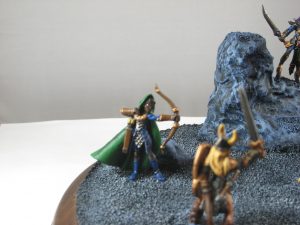
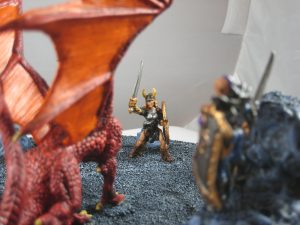
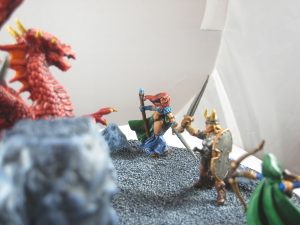
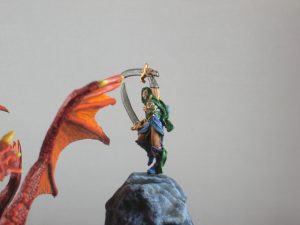
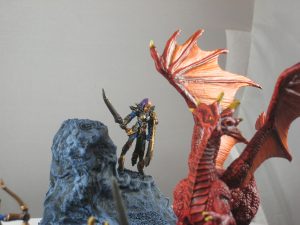
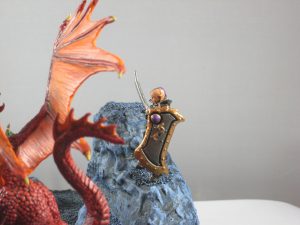
I took a ton of in-process pics while I was building this, along with my own musings, if that’s the sort of thing you find interesting.

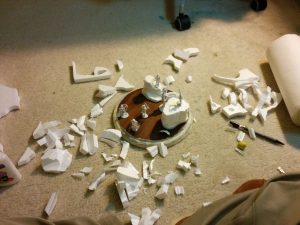
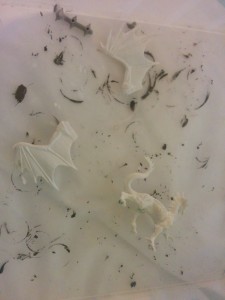

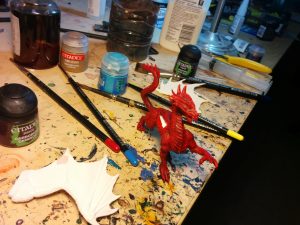



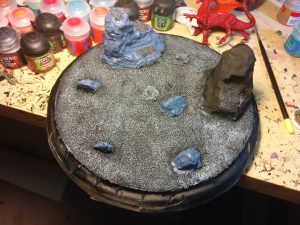
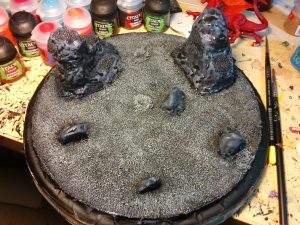
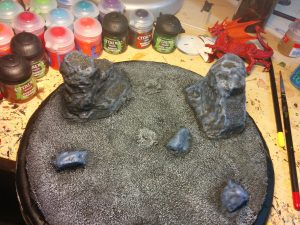
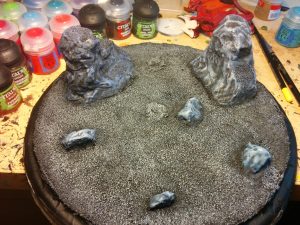
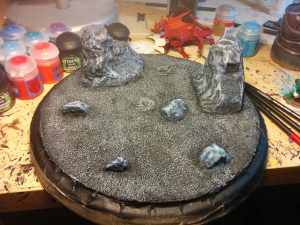
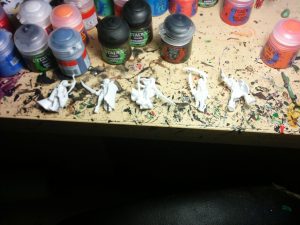
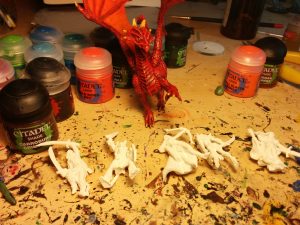
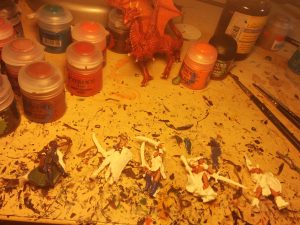
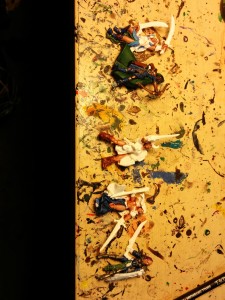
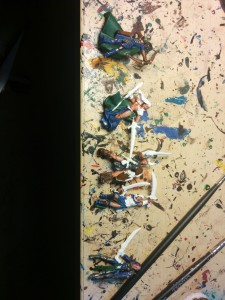
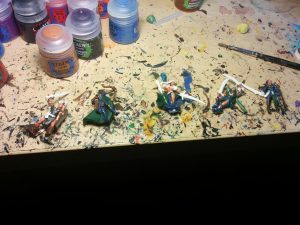
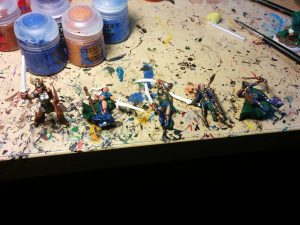
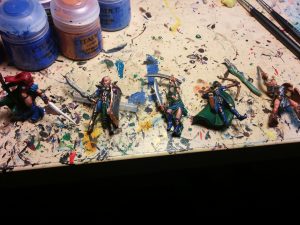
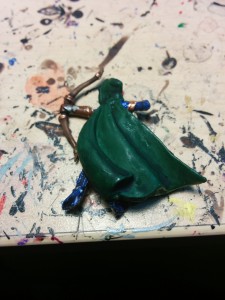
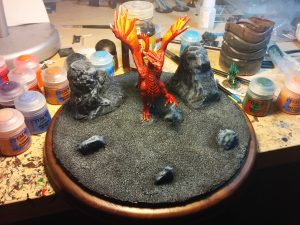
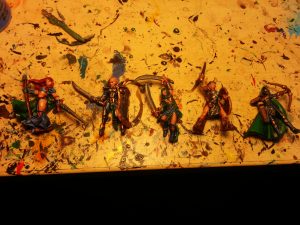
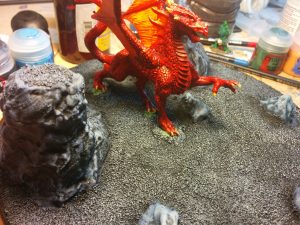
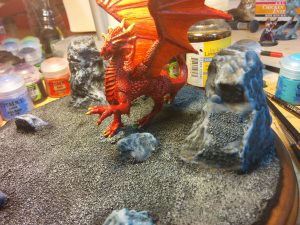
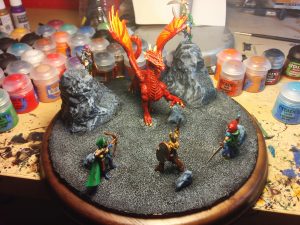
Lessons Learned
A while back, I was introduced to the game The Doom That Came To Atlantic City. The game itself is fun — it plays like a kind of reverse Monopoly, where you rampage around destroying houses to open gates to the nether realms — but more importantly for my purposes, it came with a set of awesome figures as playing pieces. They’re based on art by Lee Moyer and sculpted by Paul Komoda. I knew I wanted to paint them immediately, and fortunately soon after one of my friends bought a copy of the game.
Taking decent pictures of minis with my little point-and-shoot is bear, and these are just about at the edge of my ability to paint, but I was at least reasonably happy with how the set turned out. Let’s do the roll call!
Great Cthulhu comes first, naturally. His paint job was pretty straightforward — just basecoat, wash, drybrush, and a little touchup on the highlights, and a similar process for his base. I still don’t quite have the hang of painting gemstones though.
Yog-Sothoth, The Lurker at the Threshold, was a bit of a puzzle. It’d be easy for him to end up as just a purple blob, which isn’t that interesting. I thought about doing him as soap-bubble spheres, but my painting skills aren’t up to that, so I decided to stick closer to Lee’s art which shows him as purple, and work on my manual highlighting technique. Still getting there.
Shub-Niggurath, the Black Goat of the Woods With a Thousand Young, is a deliciously complicated figure. Just teasing out which bit is part of which creature took forever. Color-wise I thought of him as kind of a weird mish-mash of stuff, but I’m not sure it came out as well as I imagined. I might have backed off the flesh-tone in the middle a bit? Who knows!
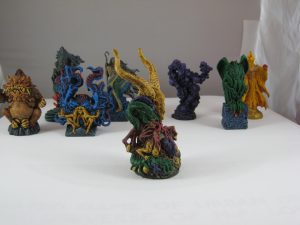
Hastur, the King in Yellow, is very, well, yellow. I don’t paint in yellow much, just because it’s a fiddly color to work with, but I was pretty happy with how the new GW yellow wash worked. Mixing in some golds and oranges seems to have worked as well. Trying again for a gem-like thing on his sphere, not sure it really worked. One downside to the yellow is the bright light makes it look weird and breaks up the blending.
Tsathoggua, the Sleeper of N’Kai, was also pretty straightforward, since so much of his body is textured. The art actually shows him as light purple, but I thought he’d be too close to Yog that way, so I did him as brown-furred. A bunch of blending back and forth until it looked okay, basically.
Ithaqua the Wind-Walker was also straight-forward, because he looks very similar to some of the Cryx (undead) models I did for a Warmachine army. I used my standard zombie-skin mix (purple and green washes for a mottled look) and a blue-and-green drybrush on the swirling winds to make them look eldritch.
Azathoth, the Daemon Sultan, came out a little weird. I really like how the color combination ended up, the blue and red, but the underlying parts came out too dark, so the highlights look like they’re “floating”, especially with the relatively light chitin. If I were doing it against I’d use a light blue undercoat and less wash.
Nyarlathotep, the Crawling Chaos, was a ton of fun to paint but an absolute pain to photograph. Something about his downward-looking face makes him really hard to get in focus. This is probably my favorite figure, I love the asymmetry and the contrast between the smooth and weird-looking parts of his figure. The blue and green color scheme worked better than I expected with the gold.
The gang’s all here!
As usual, we authors do these yearly posts where we point out that there are awards out there, and that while we of course don’t want the awards, honestly, how gauche would that be, we probably wouldn’t actually turn down the award in the event that other people of their own free will, without being prejudiced, decided that we were the most award-worthy person in that particular category.
So, in that spirit, here are the things you should nominate me for this year:
The Campbell Award for new writers. This is my second (that is, final) year to be eligible for it. After that I’m an old fogey forever.
Others on that list that deserve your consideration: M.L. Brennan, Brian McClellan, Wes Chu, Luke Scull, Michael Martinez. (That’s just people I happen to know, off the second-year list, I’m sure there are many other worthies.)
Hugo — Best Novel:
The Shadow Throne is eligible this year, as is The Forbidden Library, though kids’ books are rarely nominated. In all honesty, I don’t deserve this one, because this year is an incredibly strong field (I will probably cast my personal vote for Robert Jackson Bennett’s City of Stairs) but if you’d like to throw Shadow Throne a nomination, I’d be honored to see it on the list.
Hugo — Best Novella:
John Golden, Freelance Debugger qualifies here, and I thought it was a lot of fun. If you haven’t taken a look at it, it’s now available in e-book, audio, and paperback (bundled with the other John Golden story). Have a look!
That’s about it for my stuff. In all seriousness, though, if you’re a WorldCon member, please nominate something — voting has been robust for the final round, but the nomination process is shakier since fewer people participate. Support your favorites!
I have finally gotten the go-ahead to share a few details of The Shadow Campaigns book #3, including its title — The Price of Valor. Soon we may even have a cover to show off! In the meantime, here’s the flap copy. More soon! (Publishing July 2015!)
In the latest Shadow Campaigns novel, Django Wexler continues his “epic fantasy of military might and magical conflict” following The Shadow Throne and The Thousand Names, as the realm of Vordan faces imminent threats from without and within.
In the wake of the King’s death, war has come to Vordan.
The Deputies-General has precarious control of the city, but it is led by a zealot who sees traitors in every shadow. Executions have become a grim public spectacle. The new queen, Raesinia Orboan, finds herself nearly powerless as the government tightens its grip and assassins threaten her life. But she did not help free the country from one sort of tyranny to see it fall into another. Placing her trust with the steadfast soldier Marcus D’Ivoire, she sets out to turn the tide of history.
As the hidden hand of the Sworn Church brings all the powers of the continent to war against Vordan, the enigmatic and brilliant general Janus bet Vhalnich offers a path to victory. Winter Ihernglass, newly promoted to command a regiment, has reunited with her lover and her friends, only to face the prospect of leading them into bloody battle.
And the enemy is not just armed with muskets and cannon. Dark priests of an ancient order, wielding forbidden magic, have infiltrated Vordan to stop Janus by whatever means necessary…
I’ve got a couple of convention appearances coming up, so here’s my schedule if you want to catch up with me. I’ll be bringing my cool new steel bookmarks along to signings, so if you want one come say hi!
(All times local time.)
(This is still under construction, so stuff may be added as I get details. Here’s what’s solid.)
Tuesday August 12, 6:00 PM Fantasy in the Court, Goldsboro Books
Very impressive guest list for this, I’ll be mingling. You’ll need tickets, check the link.
Wednesday August 13, 6:30 PM: Fantasy-Faction Grim Gathering, Waterstones Kensington
I’m not a guest at this one, but it will be awesome, and I’ll be there. If you want me to sign a book, just come say hello! Check that Facebook link for details.
Thursday August 14, 12:30 – 1:00 PM: Reading, London Suite 1 (ExCeL)
Thursday August 14, 7:00 – 8:00 PM: “You Got Your SF in My Anime!” (Capital Suite 2 (ExCeL))
“If the cliche image of Western science fiction is spaceships and aliens, the cliches of anime SF might be giant robots and cyberspace — so let’s look a little closer. What’s distinctive about anime’s use of SF, in works such as Ghost in the Shell, Spaceship Yamato, Strike Witches or Planetes? What are the lines of influence between the Japanese and Western SF traditions, and what does each have to offer the other?”
Sarah Ash (Moderator), Juan Sanmiguel, Lars Adler, Django Wexler, Laura Mauro
Friday August 15, 10:00-11:00 AM: “I Like My Secondary World Fantasy a Little on the Techy Side” (Capital Suite 4 (ExCeL))
“Some secondary world fantasies, like Brandon Sanderson’s “Alloy of Law”, Francis Knight’s “Fade to Black”, and Adrian Tchaikovsky’s “Shadows of the Apt”, have ventured into industrialisation. To what extent can the kinds of narratives common in secondary world and epic fantasies find a home in these kinds of settings? Is technological development less “believable” in a world with magic?”
Django Wexler (Moderator), Robert Jackson Bennett, Floris M. Kleijne, Glenda Larke, Adrian Tchaikovsky
Saturday August 16, 1:30-3:00 PM: “Where Have All the Clerics Gone?” (Capital Suite 8+11 (ExCeL))
“Every adventuring party needs a healer! A dedicated person of the gods to keep on hit points. While modern fantasies with their new fangled “magic systems” have replaced the old study oriented wizard, reinterpretations of the cleric are not as obvious. Has the cleric been redefined? If not, why not?”
Django Wexler (Moderator), Scott Lynch, Den Patrick, Danie Ware, P. C. Hodgell
Saturday August 16, 6:00 – 7:00 PM: “Coming of Age in Game of Thrones” (Capital Suite 14 (ExCeL))
“In a world were life and death hang in the balance for every character no matter how despised or loved, it is the children who pay the heaviest price. Their parents’ plots and intrigues sit squarely upon the shoulders of the Stark, Lannister, and Targaryen children, snatching their childhoods away and forcing them to wield their own power to survive the game of thrones. But have the adults underestimated their children’s value as players? Who will survive? Who will gain power? Will they have a chance to be children again? And who will be the biggest surprise? At what point do these children, despite their tender ages, take on the mantels of their parents and become adults themselves? Panelists will examine issues surrounding childhood and coming of age during a time of conflict where familial normalcy is gone and the rules of their world are in the process of being rewritten. *Spoiler Alert: Discussion will include all previously published books within the series.*”
Darlene Marshall (Moderator), Liz de Jager, John Hornor Jacobs, Django Wexler
Monday August 18, 10:00-11:00 AM: Kaffeeklatsch (London Suite 4 (ExCeL))
John Clute, Django Wexler. Requires signup.
Probably more to come on the London side! Watch this space.
Today is release day for The Shadow Throne! I’ve got lots of buying options, and an excerpt if you’re on the fence. The Thousand Names is also available in paperback!
Cool stuff from around the web:
Maps for the books on my site.
Guest post at Bibliosanctum: Writing the Revolution
Guest post at SF Signal: Writing a Sequel: Lessons Learned
Interview at The Book Plank
Excellent review at SFFWorld
Great review at Tor.com
I’ll add more as we go along!